Henry S. Huidekoper – Medal of Honor Recipient and Advocate for Veterans
Posted By Norman Gasbarro on September 26, 2013
On the day of the armistice ending World War I, 11 November 1918, there appeared in the Philadelphia Inquirer the announcement of the death of Gen. Henry Shippen Huidekoper:
Death of General Huidekoper
General Huidekoper was perhaps the senior surviving officer of those who fought on either side at Gettysburg 55 years ago. In that combat he lost an arm and his health for many years, but nothing of that fine character which remained with him to the last. Born of an ancient and wealthy Holland family of this State, he had a singularly successful career in private life.
It is well known that had he consented to enter active political life preferment awaited him, but aside from his acceptance of the postmastership of this city [Philadelphia], rather against his own inclinations, he was content to remain in private life. For this reason he was less popularly known than would have been the case had he listened to the pleadings of his friends.
Among military men he was recognized as one of the ablest and most constructive of critics. He had a wealth of knowledge which he applied to improvement of the service and with notable results, although these are familiar only to professional soldiers.
His was a long life, filled with industry and enriched by many friendships. With his passing there are left few if any veterans who received the Madal of Honor from congress for Civil War service, and none deserved the honor more than he.
Henry S. Huidekoper was born on 17 July 1839 in Meadville, Crawford County, Pennsylvania, the son of Edgar Huidekoper and Frances [Shippen] Huidekoper. After graduating from Harvard College, he accepted the position of Captain of Company K of the 150th Pennsylvania Infantry (“Bucktails”) on 30 August 1862, but he quickly rose to the position of Lieutenant Colonel of the regiment on 6 September 1862. Replacing him as Captain of Company K was David V. Derickson, also of Meadville, who was soon after appointed as the personal bodyguard of Abraham Lincoln. Two companies of the 150th Pennsylvania were assigned as infantry guard during the time Lincoln spent at the isolated Soldiers’ Home beginning in the summer of 1862.
Huidekoper’s personal connection with Lincoln resulted in a speech he later gave in Philadelphia at the Union League:
Reminiscences of Lincoln
At the monthly meeting of the Pennsylvania Commandry, Military Order of the Loyal Legion, in the Union League last night, Colonel H. S. Huidekoper read a paper entitled, “Personal Reminiscences of Lincoln…. [Philadelphia Inquirer, 10 February 1898].
At Gettysburg, on 1 July 1863, Huidekoper was was wounded several times in the right arm which resulted in its amputation. The citation he received stated that “while engaged in repelling an attack of the enemy, [he] received a severe wound of the right arm, but instead of retiring remained at the front in command of the regiment.” Following his recovery from the Gettysburg battle, Huidekoper attempted to return to the war in September 1863 and then accepted a commission as Colonel on 23 February 1864, but was unable to perform his duties, and he resigned on 5 March 1864. In 1870, he was named Major General of the Pennsylvania National Guard by Gov. John W. Geary and as the head of the Guard in 1877, he successfully put down the railroad strike of that year.
His civil service began in 1880 with a controversial appointment as Postmaster of Philadelphia – controversial because he was not from Philadelphia, but was from one of the western-most counties of the state. He served until 1886.
It was from this position of Postmaster and afterward that Gen. Huidekoper began to use his skill of oratory on behalf of veterans and in the promotion of monuments to veterans.
In 1896, Gen. Huidekoper was elected President of the 150th Pennsylvania Infantry Veterans Association:
In 1899, Gen. Huidekoper was the main speaker at the unveiling of the memorial to Gen. John Reynolds at Gettysburg:
However, his best-known effort was his role in the erection of the Pennsylvania Memorial at Gettysburg. His appointment as a member of the commission to decide on the type of memorial that should be built on the battlefield, and the subsequent death of several of the leaders of that commission, allowed him to rise to the chairmanship. When the monument was dedicated in 1910, he gave the primary speech which transferred the monument to the state.
In that oration, Huidekoper lamented that the appropriated amount of $150,000 to construct the memorial did not enable two important statues to be included – one of Abraham Lincoln and one of Andrew Curtin – but the hope was that some future legislature would appropriate the funds required. These statues were later added to the niches in the front of the memorial, although as Gen. Huidekoper pointed out, the way the roads converge on the memorial, each of the four sides could be considered as the front of the memorial.
Huidekoper concluded his remarks:
It is with special satisfaction, that the commission tenders to you this structure… As a Governor, you have been the friend of the soldier, always favoring him and actively helping him when in your power, and the encouragement and advice you have given us from time to time have tended to greatly lighten our labors. [Philadelphia Inquirer, 28 September 1910].
Two bronze plaques on the memorial bear the name of Henry S. Huidekoper:
THE COMMISSIONERS CHARGED WITH THE SELECTION OF THE DESIGN FOR THE MEMORIAL AND THE CONSTRUCTION OF IT AND WHO UNDERTOOK THE COLLECTION OF THE NAMES AND FIGURES AND OTHER DATA THEREON WHICH NECESSARILY ARE APPROPRIATE WERE…. [included name of Henry S. Huidekoper et al.].
The top portion of the plaque for the 150th Pennsylvania Infantry is shown above, with the name of Lt. Col. Henry S. Huidekoper as the second ranking officer. Previously on this blog, the plaque of the 150th Pennsylvania Infantry was featured. See: 150th Pennsylvania Infantry – Pennsylvania Memorial at Gettysburg.
At Harrisburg, there is also a memorial to the Medal of Honor recipients from Pennsylvania. The stone with the name of Henry S. Huidekoper was previously featured on this blog in one of a series of articles on that memorial:
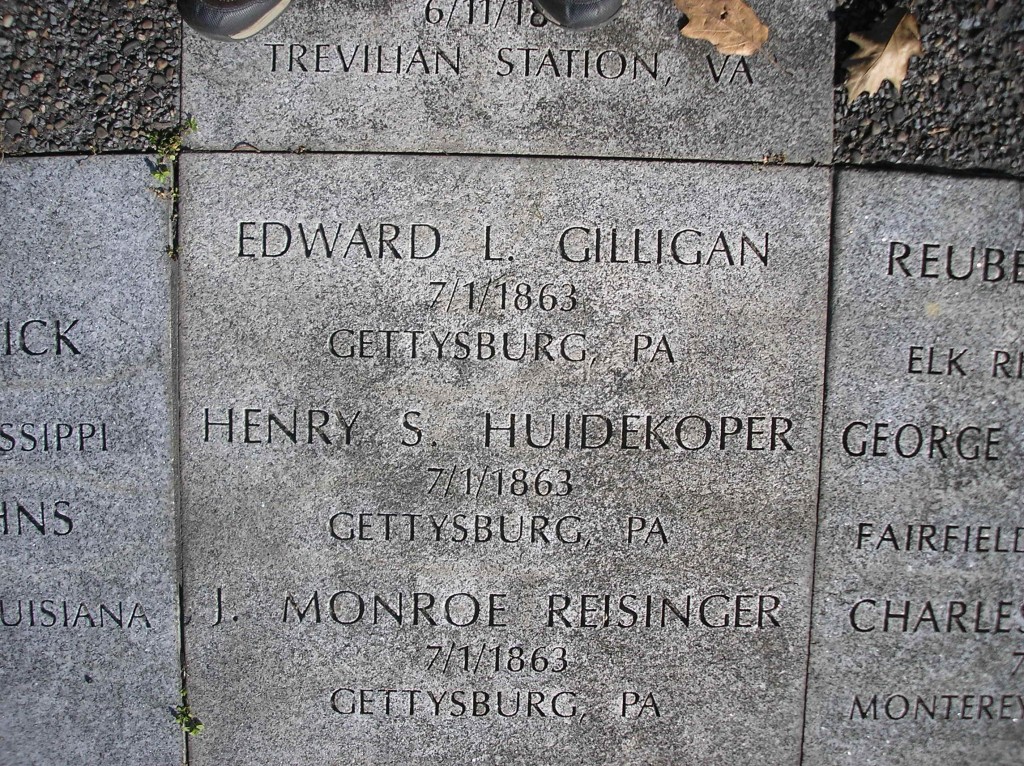
The death notice for Gen. Huidekoper, which appeared in the Philadelphia Inquirer on 11 November 1918, noted that the funeral was to take place in Meadville:
 At the Greendale Cemetery in Meadville, there are three recognitions for Gen. Huidekoper: the family mausoleum, an stone outside the mausoleum, and a bronze plaque.
At the Greendale Cemetery in Meadville, there are three recognitions for Gen. Huidekoper: the family mausoleum, an stone outside the mausoleum, and a bronze plaque.
The bronze plaque appears to be recently placed.
After the Civil War, Gen. Huidekoper received a master’s degree from Harvard College (1870) and following his stint at Postmaster of Philadelphia, was an executive in the telephone industry until his retirement in 1913. In addition, he served his alma mater as an overseer from 1898 to 1910.
—————————
The news clippings are from the on-line resources of the Free Library of Philadelphia. The portrait of Gen. Huidekoper is from Wikipedia and is in the public domain because its copyright has expired. The recent bronze grave plaque is from Ancestry.com. The other grave markers (mausoleum and stone, not shown) can be found pictured at Findagrave. Additional information about Gen. Huidekoper can be found at Wikipedia.
——————————
 ;
;
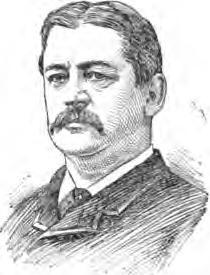
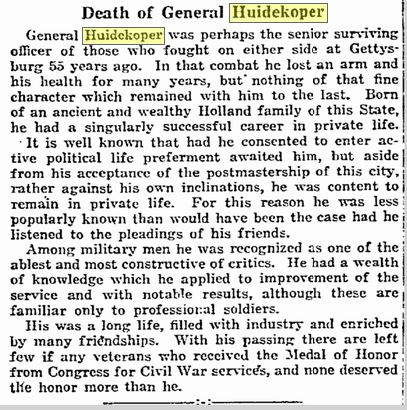
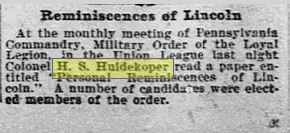
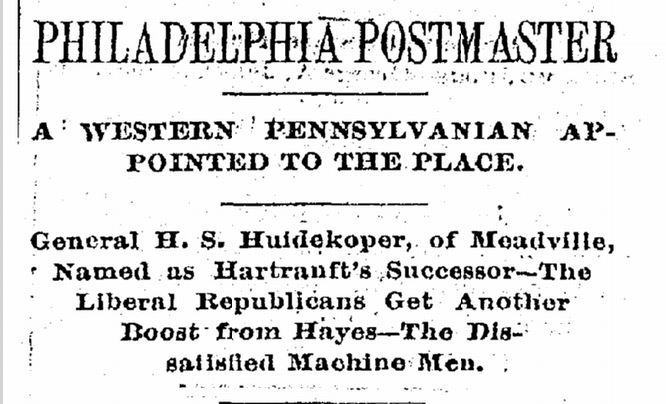
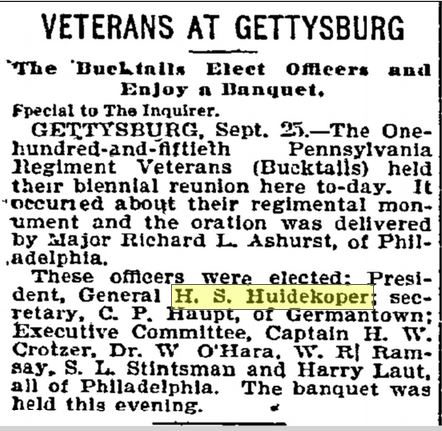
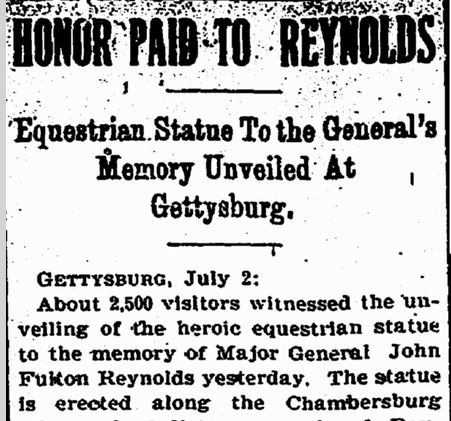
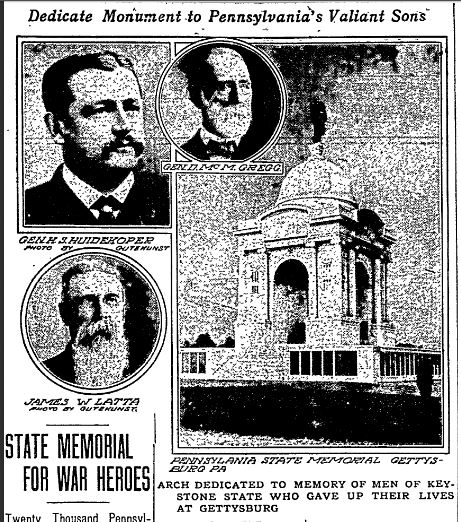
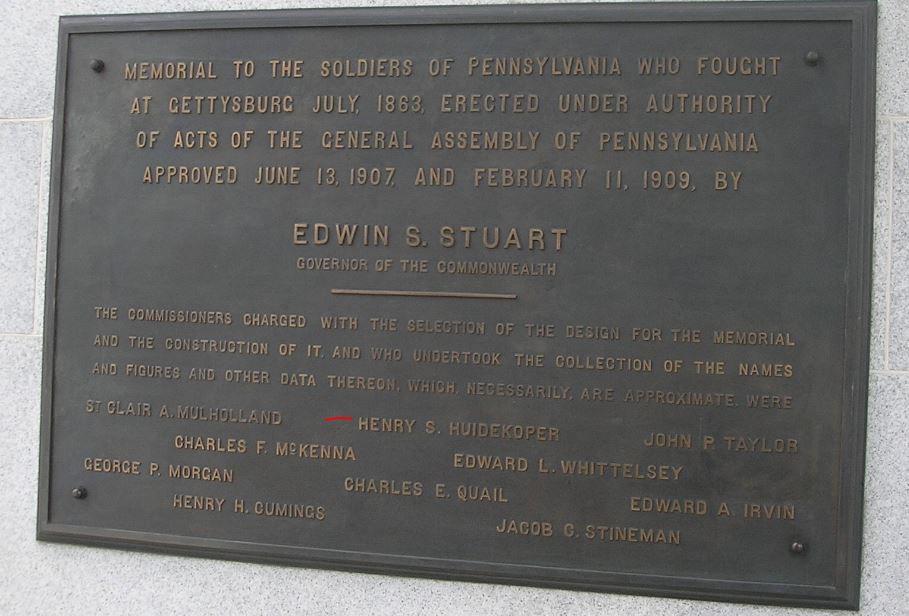
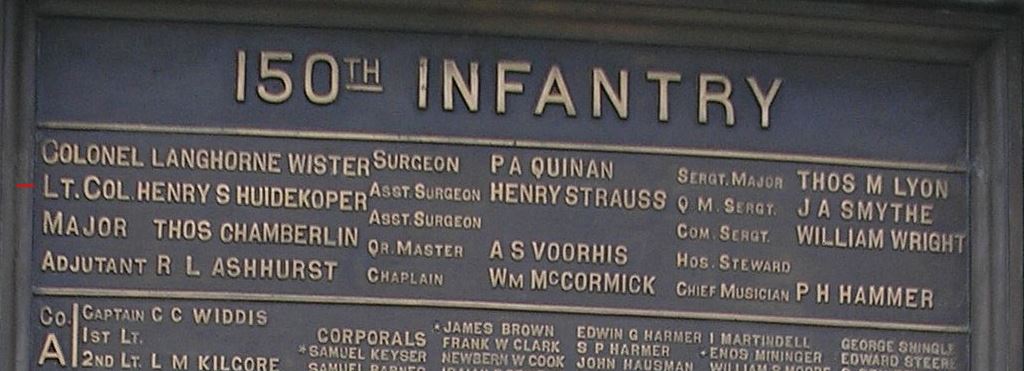
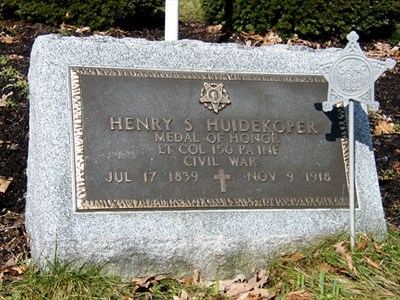


Greetings. Thank you for this informative recap of my grtgrtgrt(grt?) uncle’s Civil War efforts. Ever in your work have you come across the name of the horse he rode in the Gettysburg campaign? I would love to know.
Thank you, Ariel Dougherty